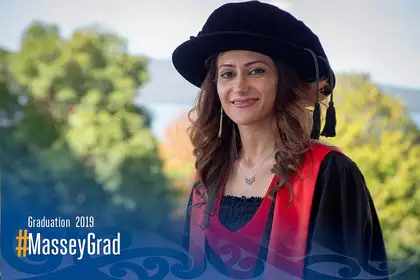
Dr Parisa Kooshesh's PhD research explored the migration experiences of Iranian women in New Zealand.
In migrating to New Zealand, many Iranian women have found the space and opportunity to redefine who they are, according to new research from Massey University.
Dr Parisa Kooshesh, who graduated last month at the College of Humanities and Social Sciences’ ceremony in Takapuna with a PhD in politics, found that Iranian migrant women are crafting new identities and changing the ways they relate to society and their families.
Her research, she says, represents the voices of women who are not normally heard or represented accurately in the media, “because the voice of their homeland government is much louder than theirs,” she says. “In most cases, the media focuses more on what politicians say or governments do, and the voices of ordinary people get lost.”
Dr Kooshesh was a political journalist in Iran who emigrated to New Zealand in 2012. For the research, she interviewed 34 Iranian women migrants for her politics thesis titled Gender, migration and politics: Pre- and post-migration experiences of Iranian women in New Zealand.
She made the decision to leave Iran due to political unrest following the 2009 elections which resulted in protesters against the hardline government being killed, arrested or imprisoned and a number of publications – including her own – being banned.
In her study, she brings a feminist lens to the motivations of Iranian females – like herself – who emigrated from Iran to New Zealand. Of those she interviewed who came here between 1979 and 2012, 32 identified as Muslim, but only five continued with daily religious practice and only one of those five continued to wear a hijab (headscarf worn by Muslim women).
Their reasons for migrating included escaping the constrictions on career opportunities and social lives. Some came because Iran’s unequal divorce laws made it difficult for them to leave destructive marriages. Even if they were able to get a divorce, societal norms made life difficult for divorced women and single mothers.
The biggest change was the shift in power dynamics within families and relationships, with greater emphasis on gender equality in New Zealand compared with a strictly patriarchal system in Iran enforced through poltical and religious systems.
Interestingly, while men had more to lose with the shift to a more open, liberal democracy, most participants did not report this having a negative impact on their relationships. In fact, most reported that they became closer friends with their partners after immigration, despite the significant challenges of new family living arrangements, different sources of income, shifts in social status, and the stresses life in a new context.
Morality police target women
Dr Kooshesh says that many Iranians left their country during the past few decades, mainly due to the political, social, and economic consequences of the 1979 Islamic revolution. “Women, in particular, were targeted by the powerful paramilitary volunteer militia Basij, which enforces strict Islamic dress code and Sharia law, operating as a morality police force and undermining hard-won rights for women.”
Her study participants revealed that although being Iranian is basic to who they are, most “do not view Islam as a defining feature of their identity. Most of them do not practice an Islamic dress code, or regard themselves as ‘Muslim’ in a strictly observant sense, although some of them regard their faith as an important personal, private matter. Most of them wish to avoid being labelled as Muslim and some of them openly disavow any affiliation with Islam.”
“My research finds that these migrant women have not changed their views of religion since coming to New Zealand. They only found more freedom to show their true feelings about religious orthodoxy.”
Understanding diversity among migrant groups
Dr Kooshesh notes in her introduction a growing anxiety and antagonism towards migrants from Muslim countries settling in the West as a result of 9/11 and other terror attacks. A consequence of this is “the idea that people of diverse social origins can live together in multicultural societies has grown more controversial. Political concerns over cultural compatibility have been especially focused on Muslim communities.”
In New Zealand, migration has also been a contested political issue with debate over the numbers of migrants we receive. She hopes her study improves our understanding of the diversity among migrants from various mainly Muslim nations, and it that helps to dispel commonplace assumptions and stereotypes about migrants from Muslim countries. There are an estimated 4000 residents who identify as Iranian or Persian in New Zealand, according to 2013 census data, and about six million Iranians live outside Iran all over the world – roughly seven per cent of the country’s total population.
“Although many other migrants with Islamic backgrounds are concerned over how they can preserve their Islamic identity in a Western context, probably most Iranian migrants feel that their attitudes and values are already more compatible with Western social norms than with the norms of traditional Islamic societies,” she concludes.